The AMD Ryzen Threadripper 3960X and 3970X Review: 24 and 32 Cores on 7nm
by Dr. Ian Cutress, Andrei Frumusanu & Gavin Bonshor on November 25, 2019 9:05 AM ESTCPU Performance: Web and Legacy Tests
While more the focus of low-end and small form factor systems, web-based benchmarks are notoriously difficult to standardize. Modern web browsers are frequently updated, with no recourse to disable those updates, and as such there is difficulty in keeping a common platform. The fast paced nature of browser development means that version numbers (and performance) can change from week to week. Despite this, web tests are often a good measure of user experience: a lot of what most office work is today revolves around web applications, particularly email and office apps, but also interfaces and development environments. Our web tests include some of the industry standard tests, as well as a few popular but older tests.
We have also included our legacy benchmarks in this section, representing a stack of older code for popular benchmarks.
All of our benchmark results can also be found in our benchmark engine, Bench.
Speedometer 2: JavaScript Frameworks
Our newest web test is Speedometer 2, which is a accrued test over a series of javascript frameworks to do three simple things: built a list, enable each item in the list, and remove the list. All the frameworks implement the same visual cues, but obviously apply them from different coding angles.
Our test goes through the list of frameworks, and produces a final score indicative of ‘rpm’, one of the benchmarks internal metrics. We report this final score.
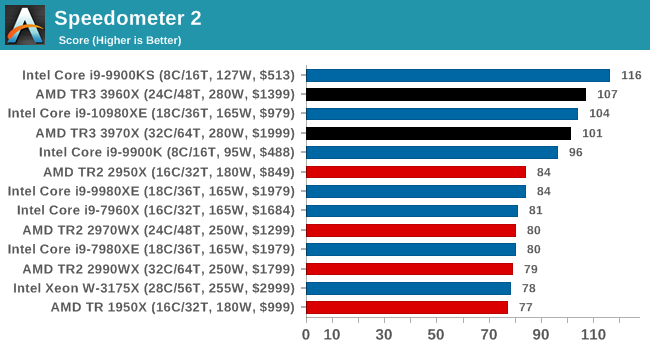
Google Octane 2.0: Core Web Compute
A popular web test for several years, but now no longer being updated, is Octane, developed by Google. Version 2.0 of the test performs the best part of two-dozen compute related tasks, such as regular expressions, cryptography, ray tracing, emulation, and Navier-Stokes physics calculations.
The test gives each sub-test a score and produces a geometric mean of the set as a final result. We run the full benchmark four times, and average the final results.
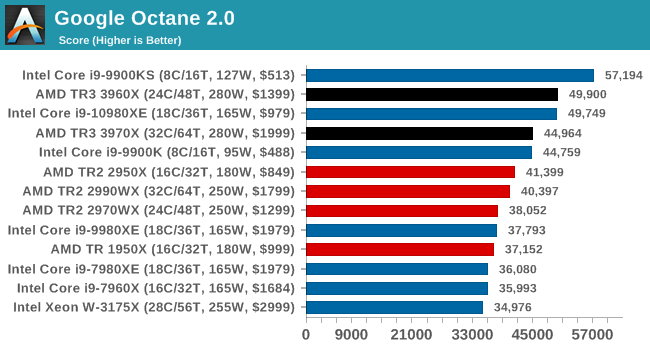
Mozilla Kraken 1.1: Core Web Compute
Even older than Octane is Kraken, this time developed by Mozilla. This is an older test that does similar computational mechanics, such as audio processing or image filtering. Kraken seems to produce a highly variable result depending on the browser version, as it is a test that is keenly optimized for.
The main benchmark runs through each of the sub-tests ten times and produces an average time to completion for each loop, given in milliseconds. We run the full benchmark four times and take an average of the time taken.
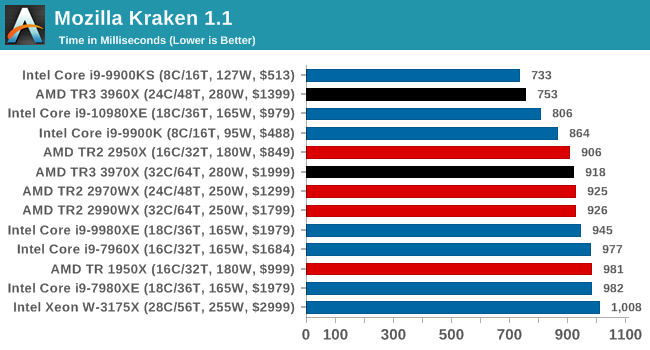
3DPM v1: Naïve Code Variant of 3DPM v2.1
The first legacy test in the suite is the first version of our 3DPM benchmark. This is the ultimate naïve version of the code, as if it was written by scientist with no knowledge of how computer hardware, compilers, or optimization works (which in fact, it was at the start). This represents a large body of scientific simulation out in the wild, where getting the answer is more important than it being fast (getting a result in 4 days is acceptable if it’s correct, rather than sending someone away for a year to learn to code and getting the result in 5 minutes).
In this version, the only real optimization was in the compiler flags (-O2, -fp:fast), compiling it in release mode, and enabling OpenMP in the main compute loops. The loops were not configured for function size, and one of the key slowdowns is false sharing in the cache. It also has long dependency chains based on the random number generation, which leads to relatively poor performance on specific compute microarchitectures.
3DPM v1 can be downloaded with our 3DPM v2 code here: 3DPMv2.1.rar (13.0 MB)
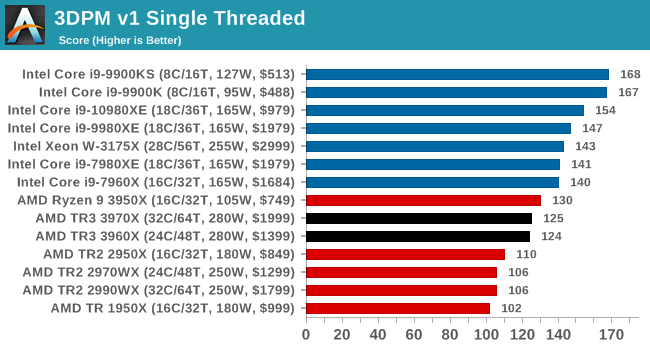
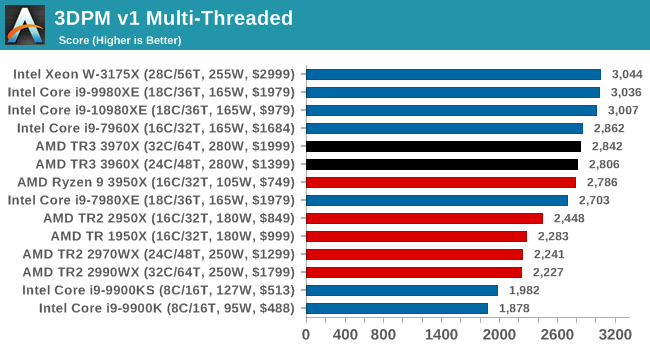
x264 HD 3.0: Older Transcode Test
This transcoding test is super old, and was used by Anand back in the day of Pentium 4 and Athlon II processors. Here a standardized 720p video is transcoded with a two-pass conversion, with the benchmark showing the frames-per-second of each pass. This benchmark is single-threaded, and between some micro-architectures we seem to actually hit an instructions-per-clock wall.
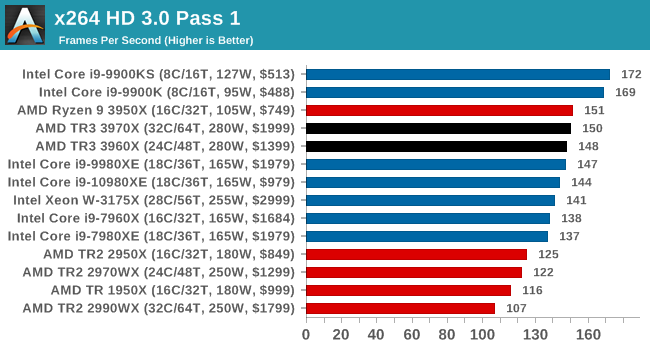
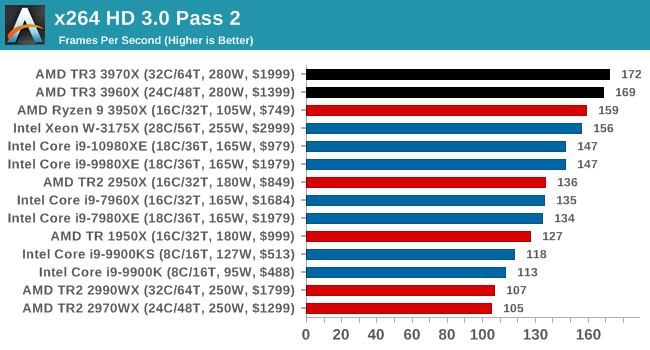
GeekBench4: Synthetics
A common tool for cross-platform testing between mobile, PC, and Mac, GeekBench 4 is an ultimate exercise in synthetic testing across a range of algorithms looking for peak throughput. Tests include encryption, compression, fast Fourier transform, memory operations, n-body physics, matrix operations, histogram manipulation, and HTML parsing.
I’m including this test due to popular demand, although the results do come across as overly synthetic, and a lot of users often put a lot of weight behind the test due to the fact that it is compiled across different platforms (although with different compilers).
We record the main subtest scores (Crypto, Integer, Floating Point, Memory) in our benchmark database, but for the review we post the overall single and multi-threaded results.
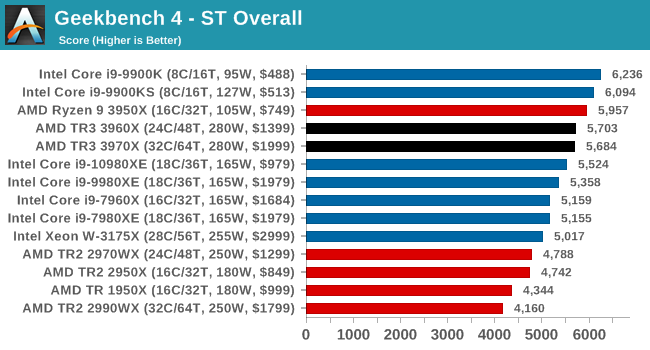
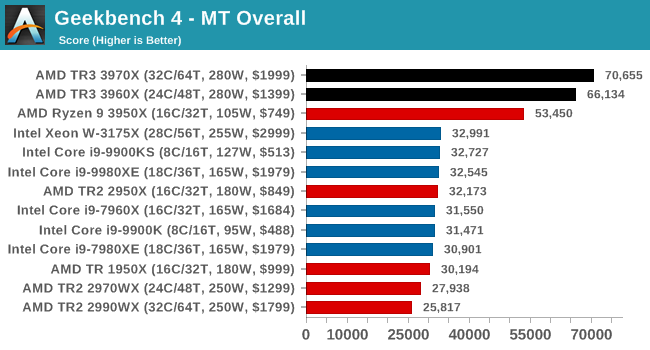










245 Comments
View All Comments
csutcliff - Monday, November 25, 2019 - link
RIP IntelNikosD - Monday, November 25, 2019 - link
It's a bloodpath.Threadrippers destroy even the Xeon W-3175X of 3000$.
Intel is having hard times, no doubt about it.
They look so incompetent nowadays.
melgross - Monday, November 25, 2019 - link
You guys are really funny. Intel had its best year yet, and will have an even better one next year.While you can hope that AMD will take the industry over, it’s never going to happen. We’ve seen that predicted in the past, and it isn’t any truer now.
Xyler94 - Monday, November 25, 2019 - link
The difference though, I don't think Intel can weasel their way through this storm as they did with the Athlon days.They didn't stay in the lead because people didn't want to buy AMD, they stayed because DELL and them were bribbed not to sell AMD, so your average consumer knew nothing about how much better the AMD platforms were.
Intel still holds the performance crown for laptops, which is arguably the bigger segment of the consumer market, but if they don't do something soon, AMD has the performance crown in HEDT and Servers now, both high margin areas, which Intel is super worried about.
Santoval - Monday, November 25, 2019 - link
Next year we will see Comet & Ice Lake based laptops compete with Zen 2 (+ Navi?) based laptops. Zen 2 based laptops will certainly surpass both in CPU performance, so the question is only if they'll be able to surpass the performance of the (Gen11) iGPU of Ice Lake. By that I mean only the parts with the 64 EUs of course, the Gen11 iGPUs with 24 and 48 EUs stand on chance.In any case, it appears that Comet Lake-U/Y will power the largest bulk of Intel's machines, machines with Ice Lake-U/Y will be released in low volume, and Ice Lake-U machines with 64 EU iGPUs will almost certainly be rarer than francium and more expensive than their weight in gold.
Santoval - Monday, November 25, 2019 - link
edit : "stand *no* chance".jabber - Tuesday, November 26, 2019 - link
Guys, some of you may not remember but we've been in this situation before.There was a time that Intel was king and could do no wrong. then about 16 years ago they could not do a thing right and everyone was AMD/SKT939 till the day they died. Ho ho ho!
Then AMD screwed up, Intel got it's act together and AMD was 'so over' etc. etc.
No doubt AMD will screw up again in a couple of years and Intel will get it together again...
Rinse and repeat. Just enjoy the ride.
xrror - Tuesday, November 26, 2019 - link
What really sucked was seeing AMD management at the time just sit there like a sitting duck. People playing with overclocking Pentium M on desktop boards demonstrated nearly a year before Conroe launched that if Intel developed their mobile design into a desktop chip that it would be a monster chip against A64.And Intel did just that.
That said, this time around... Sunny Cove had better start to scale clock wise, else it won't matter that it's 20% faster per clock if it can't actually reach 4Ghz.
It's going to be interesting.
DaBones - Wednesday, November 27, 2019 - link
A quick difference between then and now is that both companies are doing good things. Neither is releasing a dumpster fire of a product, this time around. That's just really cool, and whoever gets shiny, metal hats, I still have some pretty good hardware options!.arcamdomain - Tuesday, December 17, 2019 - link
AMD have never been this ruthless, zen has been a massive turning for all of the market, bringing the prices down and increasing performance from both sides, unfortunately for intel, AMD have the bigger arms in this arms race, TSMC and AMD are already talking about 5nm and 3nm respectively, at which point does this become a ant vs boot scenario.